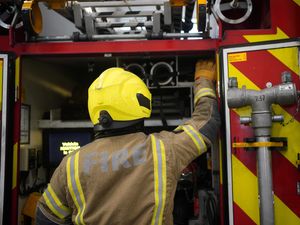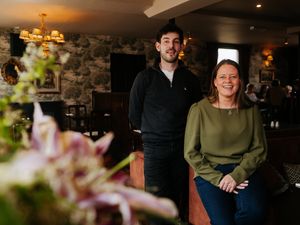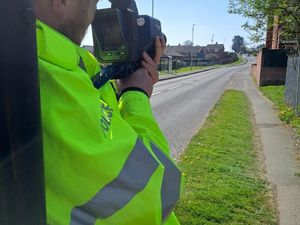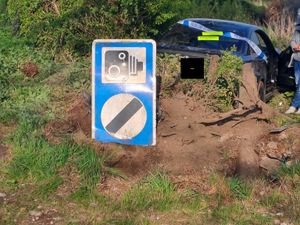Medals awarded to incredible SAS parachute dog expected to raise more than £20k at auction
A medal awarded to a Shropshire dog which was parachuted behind enemy lines on SAS missions is going up for auction.
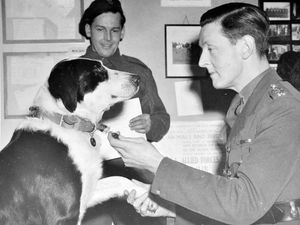
The black and white Collie Retriever, Rob, originally from Colemere Farm near Ellesmere, was volunteered as a war dog during the Second World War.
He took part in 20 parachute descents throughout the war, and was awarded the PDSA Dickin Medal for Gallantry, otherwise known as the Victoria Cross for animals, as well as the RSPCA Red Collar for Valour, for his outstanding service.
The Dickin Medal will be auctioned on Wednesday, October 12, by Noonans – with a guide price of £20,000 to £30,000.
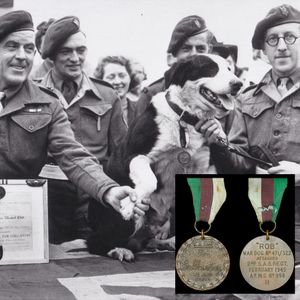
Rob's descents were made while serving with Infantry in North Africa and the 2nd SAS Regiment.
The proceeds of the auction will be given to the Taylor McNally Foundation.
The medal is being sold with an extensive archive including Rob's collar, a portrait painting, photographs, certificate, manuscripts, books and letters.
Rob was bought as a puppy from Colemere Farm near Ellesmere in 1939 for five shillings, and lived his early years with the Bayne family of nearby Tetchill as their farm dog and pet.
His owners volunteered him as a War Dog in 1942 and he was signed up on May 19 of that year.
Following action in the North Africa campaign, from September 1943, Rob served with the SAS, the first war dog to do so.
With the regiment, he took part in operations in Italy, parachuting in on sabotage missions.
Christopher Mellor-Hill, Head of Client Liaison at Noonans said: “Rob the Parachuting Dog is the most famous of all the Dickin Medal recipients and we are delighted to be offering his medals on behalf of the family who owned him.
"Rob was the first War Dog attached to the SAS to be awarded the ‘animal VC’, and was reportedly the only War Dog to have been nominated for the Dickin Medal by the War Office.”
He added: “Demobilised on November 27, 1945, Rob led the Wembley Parade of 32 war dogs on July 16, 1947, in front of 10,000 spectators, being the only dog present to hold both the Dickin Medal and the RSPCA Red Collar and Medallion for Valour.
"Over the years books have been written about him and he even featured on the front page of the Radio Times. We believe this to be the most important Dickin Medal to ever be sold at auction.”
Instituted by Maria Dickin, CBE, the founder of the People’s Dispensary for Sick Animals (PDSA), in 1943, the Dickin Medal has since been awarded on 71 occasions – 32 of them going to pigeons, 34 to dogs, four to horses and one to a cat.
The vast majority – and all those awards to pigeons – were granted in respect of acts of bravery in the Second World War, but more recently a number of awards have been made to Arms and Explosives Search Dogs of the Royal Army Veterinary Corps for their gallantry in Iraq and Afghanistan.
At the time of receiving the award, Rob's owner, Edward Bayne, said how caring he had been as a farm dog: "He used to help settle the chicks in their houses at night, picking them up in his mouth when they had strayed away – he had a wonderful mouth – and tucking them in under their mothers."
The Baynes’ son, Basil, who now lives in Antrim, Northern Ireland, and is selling the medal, had learned to walk by holding onto Rob’s tail or clutching his coat, and if the child was crying Rob put his front paws up on the pram, soothed him and made him laugh.
Basil recalls: “Following his wartime exploits, Rob was returned to us and settled back into life on the farm, occasionally making public appearances to help raise funds for returning Prisoners of War and their families.
"In February 1948 he disappeared for five days with his companion, our other dog, Judy, a spaniel. Rob returning in an emaciated condition without his collar – his collar was what we called his everyday collar.
"It had red white and blue ribbon all around it.
"Several years later a local farm worker out rabbiting with spade found the collar hooked around the root of a tree. Rob had strained and lost weight until he was able to slip the collar over his head.
"This dilapidated collar, now missing all ribbons, is among the items in the auction and the strain on the holes in the collar is obvious.”
Rob died in 1952, aged 12.

